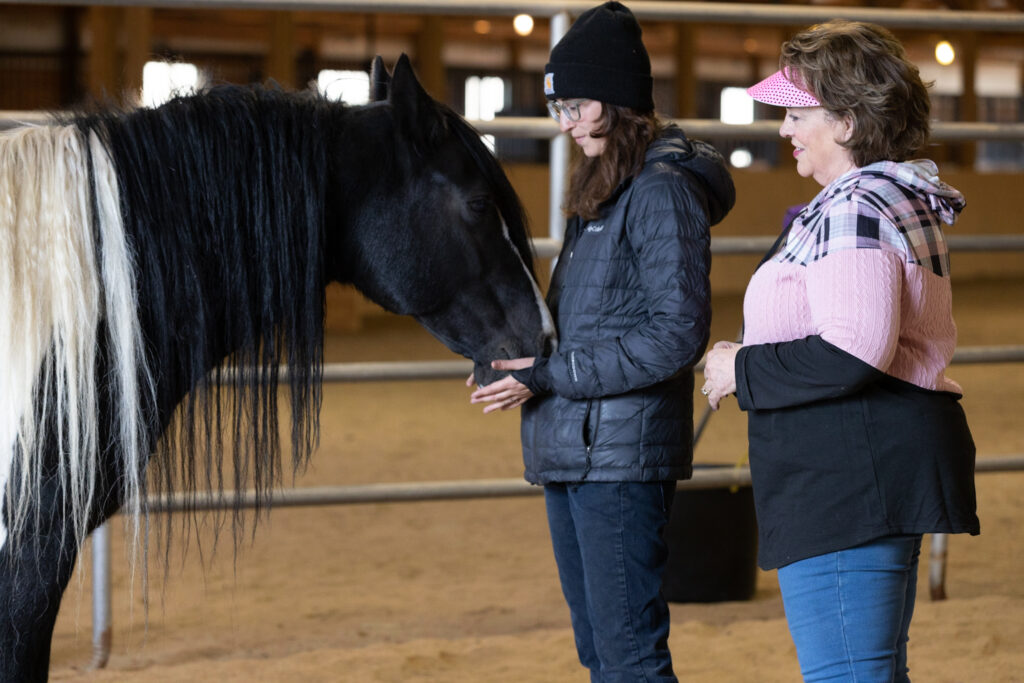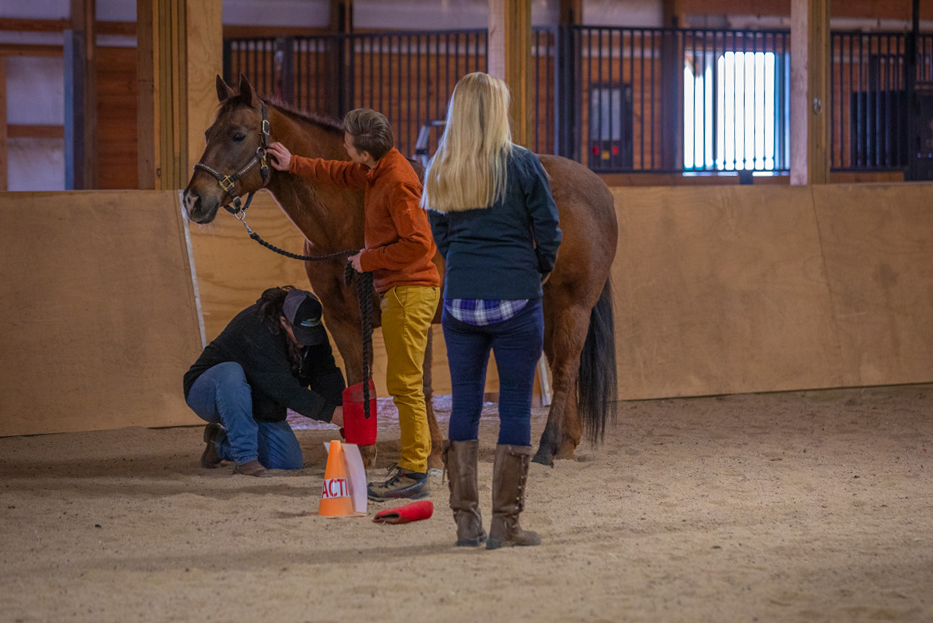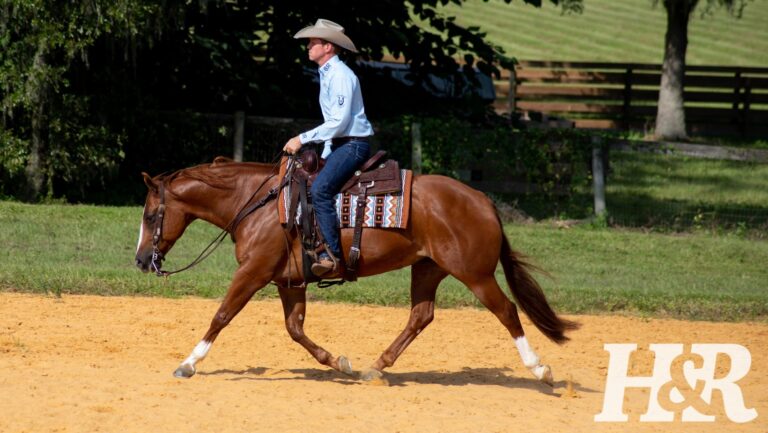This article is part of our Mental Health Awareness Month. Brought to you by Touched by a Horse.
We spend hours upon hours working with our horse, training him, teaching him maneuvers, mastering concepts. Every time you climb in the saddle, you are teaching your horse something even if it’s inadvertently. However, what can we learn from our horse? If we get quiet and reflective, our horse has so much to teach us. Here are 10 life lessons we can learn from our horse, if we are willing to listen.
Have a Little Humility
From the workhorse of years gone by, to the champion in the show pen, horses have a quiet, humble nature. They do their work and perform tasks without expectation of the bright lights of the winner’s circle or a blue ribbon pinned on their stall. It’s their human who has these ambitions. It’s certainly not bad to have high ambitions and lofty goals that we want to reach. However, having humility and being humble, especially when we achieve those goals can deepen our relationships with other people and ground us in the moment.
We can also see how having humility in our interactions with our horse can build that bond. Horses teach us that humility is not a sign of weakness, but rather a manifestation of inner strength. When we approach him with respect and openness, he responds with trust and willingness, fostering a deep sense of connection and understanding. This humility extends beyond our interactions with horses and permeates our relationships with fellow humans. It encourages us to listen attentively, empathize sincerely, and communicate with humility, leading to more meaningful and authentic connections.
Communication is Key
No matter what you’re asking your horse to do, it’s up to you to ask the correct way to achieve the response you desire. Your horse can’t read your mind, and he doesn’t speak your language. Learning how to effectively communicate with your horse will not only help you achieve your desired outcome, but build your bond.
Mastering the art of communicating clearly is a skill you can apply to your everyday life. Be open and honest with your expectations, while communicating in a clear and reasonable way. Just like your horse, other people cannot read your mind. Working on your communication skills with your horse will benefit your personal and professional relationships as well. Learn to advocate for your needs in a healthy and respectful way. Set clear intentions and consider that you might need to adjust your communication style in certain settings—or arenas.
Learn to Listen
Life isn’t just about communicating your wants and needs, but also listening to those around you. In working with your horse, you can learn how to not just communicate effectively, but to listen deeply. Although your horse can’t speak your language, he often clearly tells you what he needs through body language and behavior. Learning to read a situation and listen to what your horse is telling you will improve your horsemanship and enhance your training.

This lesson applies to your personal life, as well. Being an effective and engaged listener will make the people around you feel heard and seen. You get the chance to learn from others, and understand those in your circle to a higher degree. This also means learning to listen to body language—not just from your horse—but from the people around you. Oftentimes, people say a lot without saying a word. Enhance your communication skills by listening intently, even to things not said aloud.
Perspective is Everything
Sometimes we can put on blinders and only see the world from our perspective. To you, it might be a simple task that you are asking your horse to complete. To him, it could be new, confusing, or even scary. That water crossing is barely three inches deep from your perspective, but to a horse not used to crossing water, you might as well be asking him to swim across the sea. In your training, try and see every situation from your horse’s perspective. Not only does he not have the same field of vision as you, he also thinks like a prey animal and oftentimes responds in kind.
In the same vein, having perspective in your life away from working with your horse will give you the chance to see the world from the viewpoint of other people. Maybe that person that seemed a little bit grumpy in line at the coffee shop just got bad news about a loved one. Perhaps this assignment at work seems simple to you, but your coworker needs you to explain it a different way. Trying to understand the perspective of those around us will not only make us better leaders, but strengthen our personal and professional relationships.
Live in the Moment
Have you ever seen your horse standing serenely in the pasture, just gazing off into the distance? Have you ever been envious of that ability to live in the moment and just enjoy where you’re at? Staying present in the moment when working with your horse keeps you attentive and focused to the occurrences happening at that very minute. You can be alert to your environment around you, and attuned to your horse’s needs. You can also just enjoy being where you are at in that moment, and let go of the stressors of the day.
Although sometimes we have to focus on the future, plan for upcoming events, or reflect on the past, living in the moment sometimes is what we need to thrive. Next time you catch your mind spinning off into a million directions, try and center yourself to your immediate environment. Take a deep breath, notice 5 things around you, and remember that you’re living in the here and now.
Be Resilient
It might be a hard truth, but failure is inevitable. Obstacles and challenges will present themselves not only in your training, but in your personal life. If we expect our horse to overcome challenges in his training, we have to have the same expectations for ourselves. Just because he doesn’t nail a turnaround the first time you introduce it, doesn’t mean you quit trying to teach him. Have the same mindset for the challenges in your life.
Your horse might need to try a new task or maneuver many, many times to finally perfect it. Whether it’s hitting the perfect transition, dialing in your pocket at first barrel, or mastering speed control in a rundown, keep trying until you get it. Being resilient in your personal life will also be highly beneficial for your professional and personal goals. Failure will happen. Obstacles will need to be overcome. Don’t give up, and learn from your horse that to try again is to build resilience.
It’s Okay to Have a Bad Day
Just like us, horses can have bad days too. Sometimes you get on to ride, and you can just feel it. He’s tight, dull, or just doesn’t feel quite like himself. The first task is to rule out pain as a cause. However, sometimes your horse just has an “off” day. When you feel this from your horse, do you demand perfection and put him through his paces? Or do you show him some grace and maybe switch up your plans, go for a leisurely trail ride, or just have a relaxing grooming session? You most likely do the latter, because you care about your horse’s wellbeing.
The truth of the matter is that you are going to have bad days. When you do, think about how you would treat your horse, and show yourself the same grace. Maybe you need some time to relax and process what is going on. Maybe this is an instance where you need to push through and accomplish the task at hand, then rest later. Either way, when you have a bad day or just feel “off” take time to sit with those feelings to understand what you need. Taking care of yourself is as important as taking care of those around you.
Have a Sense of Humor
Have you ever looked at your horse and though…”why did you do that?” Our horses can be silly creatures sometimes, and get themselves into all types of predicaments. Maybe he spooked at his own shadow, or grabbed the handle of the wheelbarrow, upending the entire thing. Whatever it might be, working with horses will sure help you appreciate having a sense of humor. Sometimes you just need to laugh it off.
Being able to laugh at the little inconveniences of life and let things roll off your shoulders is a gift. Sure, sometimes things need to be taken seriously and aren’t a laughing matter. But if we can learn anything from horses, it’s that there are times when having a sense of humor will help you get through the day and find a little levity in life.
Engage Your Emotional Intelligence
Horses are incredibly sensitive to emotions and can mirror the feelings of those around them. This teaches you to understand and regulate your own emotions, as well as to be more empathetic and perceptive of the emotions of others. Learning emotional intelligence from horses can help us navigate relationships and interactions with greater awareness and empathy. This can also be simplified as learning to ‘read the room.’ Emotional intelligence is a great practice to put in place when working with horses. Knowing how to read body language and be empathetic to the emotions of others will improve your relationship with your horse and the people around you.
It’s important to feel your emotions, process them, and put an action plan into place to proceed appropriately. However, we can learn from horses that it’s also important to know how to regulate and understand our emotions. Letting your emotions get the best of you when working with your horse can be a recipe for disaster if your horse doesn’t understand the situation. This goes for working with humans, as well. Learning to understand your emotions, process them, and regulate them when appropriate can help you in your personal and professional life.

Choose Gratitude
Happiness to your horse can look like a wide open gate to the pasture. Maybe it’s a treat held out on gentle hands, or a nap in the sun. Whatever it might be, you can often see that it’s the little things that make your horse happy. Taking time to observe your horse in his environment and seeing how he responds to small things, can bring you joy as well. Having the opportunity to work with or own horses is a beautiful gift, and certainly something to be grateful about.
Choosing gratitude even when the road gets bumpy might not always be the easy path. However, life won’t always be easy. Watching your horse stretch, yawn, and soak up the sun on a beautiful day is always a good reminder that oftentimes it’s the little things that we can be grateful about.






